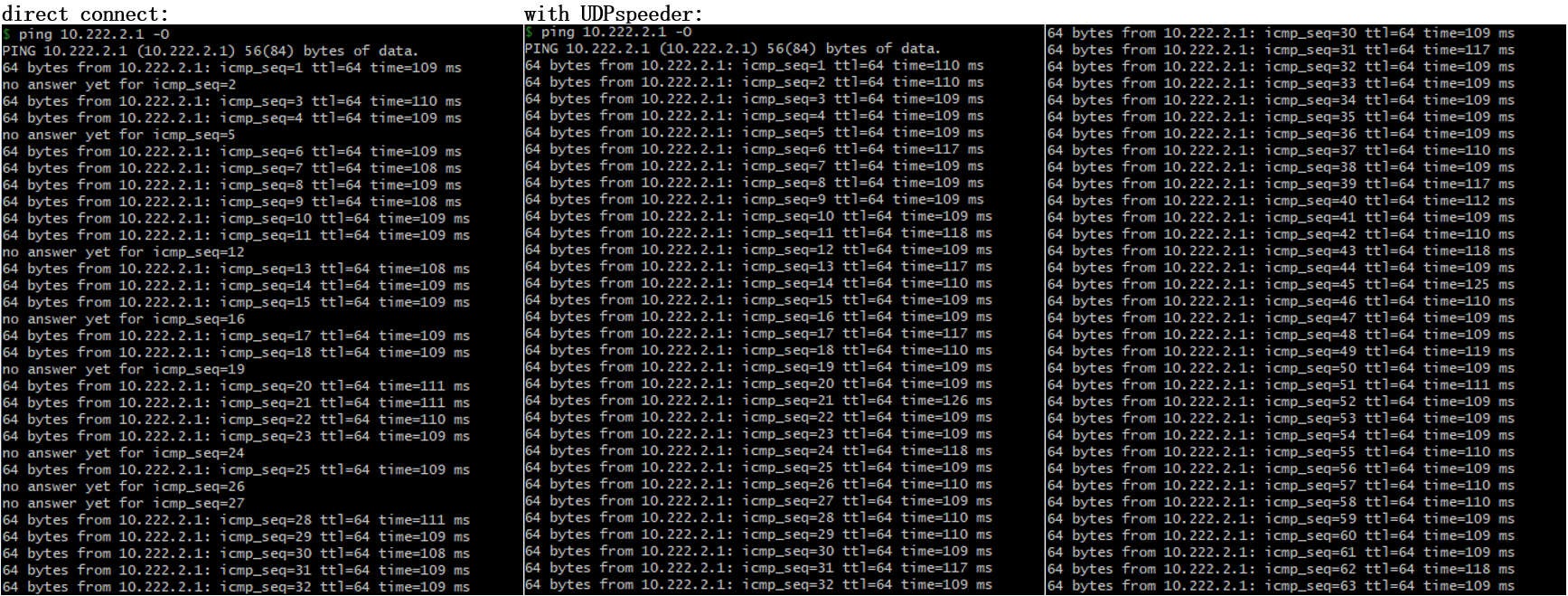3.9 KiB
UDPspeeder
A Tunnel which Improves your Network Quality on a High-latency Lossy Link by using Forward Error Correction.
When used alone, UDPspeeder improves only UDP connection. Nevertheless, if you used UDPspeeder + any UDP-based VPN together, you can improve any traffic(include TCP/UDP/ICMP), currently OpenVPN/L2TP/ShadowVPN are confirmed to be supported。
or
Assume your local network to your server is lossy. Just establish a VPN connection to your server with UDPspeeder + any UDP-based VPN, access your server via this VPN connection, then your connection quality will be significantly improved. With well-tuned parameters , you can easily reduce IP or UDP/ICMP packet-loss-rate to less than 0.01% . Besides reducing packet-loss-rate, UDPspeeder can also significantly improve your TCP latency and TCP single-thread download speed.
简体中文(内容更丰富)
Efficacy
tested on a link with 100ms latency and 10% packet loss at both direction
Ping Packet Loss
SCP Copy Speed
Supported Platforms
Linux host (including desktop Linux,Android phone/tablet, OpenWRT router, or Raspberry PI).
For Windows and MacOS You can run UDPspeeder inside this 7.5mb virtual machine image.
How does it work
UDPspeeder uses FEC(Forward Error Correction) to reduce packet loss rate, at the cost of addtional bandwidth. The algorithm for FEC is called Reed-Solomon.
Reed-Solomon
In coding theory, the Reed–Solomon code belongs to the class of non-binary cyclic error-correcting codes. The Reed–Solomon code is based on univariate polynomials over finite fields.
It is able to detect and correct multiple symbol errors. By adding t check symbols to the data, a Reed–Solomon code can detect any combination of up to t erroneous symbols, or correct up to ⌊t/2⌋ symbols. As an erasure code, it can correct up to t known erasures, or it can detect and correct combinations of errors and erasures. Reed–Solomon codes are also suitable as multiple-burst bit-error correcting codes, since a sequence of b + 1 consecutive bit errors can affect at most two symbols of size b. The choice of t is up to the designer of the code, and may be selected within wide limits.
Check wikipedia for more info, https://en.wikipedia.org/wiki/Reed–Solomon_error_correction
Getting Started
Installing
Download binary release from https://github.com/wangyu-/UDPspeeder/releases
Running (improves UDP traffic only)
Assume your server ip is 44.55.66.77, you have a service listening on udp port 7777.
# Run at server side:
./speederv2 -s -l0.0.0.0:4096 -r 127.0.0.1:7777 -f20:10 -k "passwd"
# Run at client side
./speederv2 -c -l0.0.0.0:3333 -r44.55.66.77:4096 -f20:10 -k "passwd"
Now connecting to UDP port 3333 at the client side is equivalent to connecting to port 7777 at the server side, and the connection has been boosted by UDPspeeder.
Note
-f20:10 means sending 10 redundant packets for every 20 original packets.
-k enables simple XOR encryption
Improves all traffic with OpenVPN + UDPspeeder
See UDPspeeder + openvpn config guide.
wiki
Check wiki for more info:
https://github.com/wangyu-/UDPspeeder/wiki
Related repo
You can also try tinyfecVPN, a lightweight high-performance VPN with UDPspeeder's function built-in.
tinyfecVPN's repo:
https://github.com/wangyu-/tinyfecVPN
You can use udp2raw with UDPspeeder together to get better speed on some ISP with UDP QoS(UDP throttling).
udp2raw's repo:





